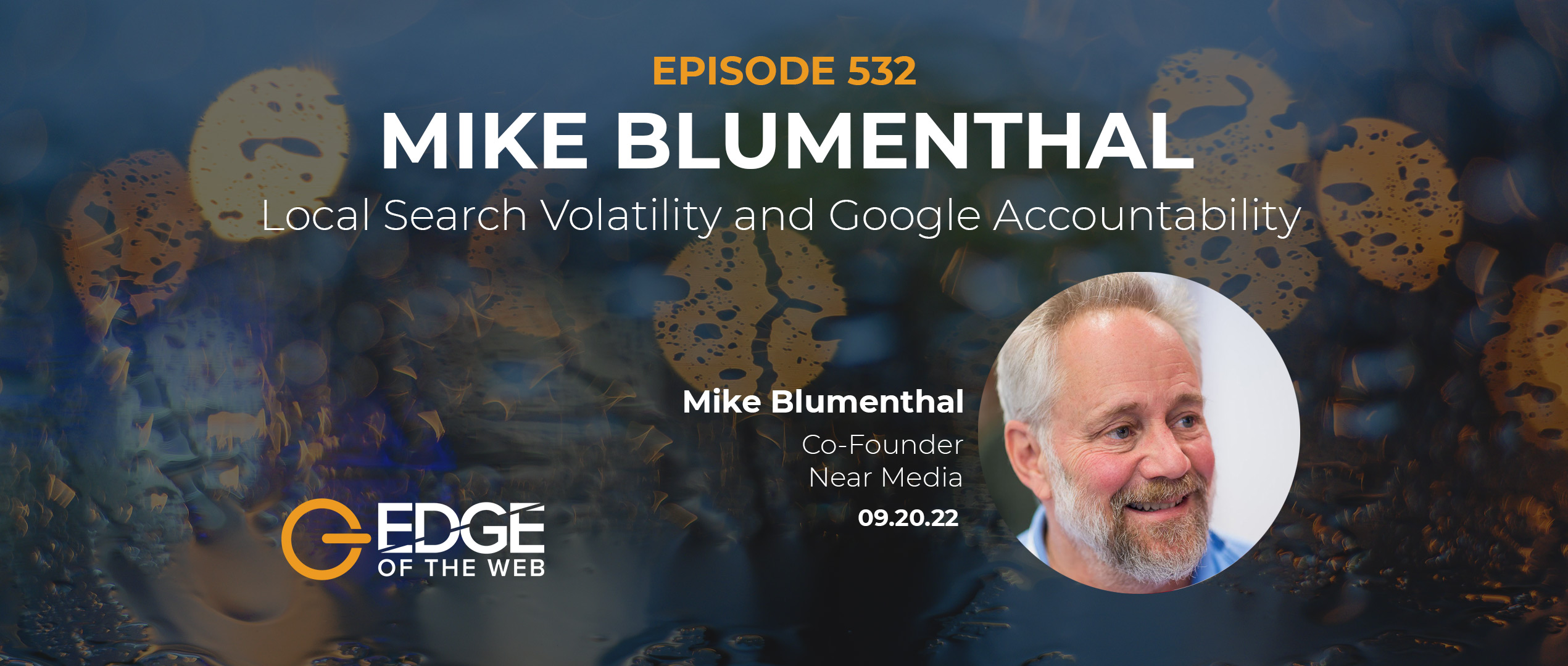A lover of all things local, Mike has been actively engaged with Local Search questions since 2005 and blogging about them since 2006. In 2010 with a number of peers he cofounded Local U (LocalU.org) in an effort to share current, ethical and effective local marketing tactics with small businesses and SEO. With Don Campbell, he cofounded GetFiveStars, as SaaS product that allows location based businesses to more easily measure customer satisfaction, automatically post testimonials to their websites, identify their promoters and interact with the review sites.
Mike can be reached on Twitter @mblumenthal or via LinkedIn
Recent Shows with Mike Blumenthal
 534 | Images and Local Search with Mike BlumenthalInterviews / podcastGo Local!
Mike Blumenthal’s second segment on the EDGE takes us into the realm of the value of image optimization for Local Search. It’s a huge conversion factor for businesses that can be easy wins. Check out the incredible tool, AirCam.ai – a service that gives a breakdown of all of the images your business needs for local visibility.
Mike gives us his take on the recent Google updates and how they may affect local visibility. He also unequivocally lays down his opinion about AI machine learning evaluating human content: Google’s not being accountable for the businesses that are relying on local visibility for revenue.
The HCU: Content Written For People By People Evaluated By AI
The Machine is Getting It Wrong
Is Helpful Content Update Unfair to SMBs Without Budget?
Will the Updates Affect the Knowledge Graph?
Why are Images So Valuable to Local Search?
Mike’s Pro Tip for Local Optimization: Aimcam.ai [...]
Read More About This EpisodeSeptember 27, 2022
534 | Images and Local Search with Mike BlumenthalInterviews / podcastGo Local!
Mike Blumenthal’s second segment on the EDGE takes us into the realm of the value of image optimization for Local Search. It’s a huge conversion factor for businesses that can be easy wins. Check out the incredible tool, AirCam.ai – a service that gives a breakdown of all of the images your business needs for local visibility.
Mike gives us his take on the recent Google updates and how they may affect local visibility. He also unequivocally lays down his opinion about AI machine learning evaluating human content: Google’s not being accountable for the businesses that are relying on local visibility for revenue.
The HCU: Content Written For People By People Evaluated By AI
The Machine is Getting It Wrong
Is Helpful Content Update Unfair to SMBs Without Budget?
Will the Updates Affect the Knowledge Graph?
Why are Images So Valuable to Local Search?
Mike’s Pro Tip for Local Optimization: Aimcam.ai [...]
Read More About This EpisodeSeptember 27, 2022 532 | Local Search Volatility and Google AccountabilityInterviews / podcastGoogle’s an AI-First Company
Mike Blumenthal, “Professor Maps” of the Local SEO community, catches up with the EDGE after a bit of time to lay out the volatility he’s seen local search. Mike’s been focused on the Google Business Profile forums and has seen some pretty striking and concerning developments. Witnessing around 200 review take-downs and close to 2,000 business profile suspensions per month, Mike’s a bit concerned to say the least.
Where is Google’s accountability and transparency in responding to these issues? There’s no mechanism to challenge the decision on the review take-downs.
The value of Local Search positioning and consumer interaction is unquestionable. But one question does present itself: who’s property is this, yours or Google’s?
So Many Changes in Local SEO – The Last Few Years
Local SEO Volatility: A Recent Timeline
Google Sees Their Future as Local
How Valuable is Google Local Search? Sometimes 95% of Leads
The Consumer is Trained on Google Reflection of your Brand
Hunting in GBP Forums with a Specific Focus
There’s No Support from Google, Once They Nuke a Review
Are We Just Going to Just Publish to Google in the Future?
Is This Our Property or Google’s?
Business Suspensions Complaints are 10X [...]
Read More About This EpisodeSeptember 20, 2022
532 | Local Search Volatility and Google AccountabilityInterviews / podcastGoogle’s an AI-First Company
Mike Blumenthal, “Professor Maps” of the Local SEO community, catches up with the EDGE after a bit of time to lay out the volatility he’s seen local search. Mike’s been focused on the Google Business Profile forums and has seen some pretty striking and concerning developments. Witnessing around 200 review take-downs and close to 2,000 business profile suspensions per month, Mike’s a bit concerned to say the least.
Where is Google’s accountability and transparency in responding to these issues? There’s no mechanism to challenge the decision on the review take-downs.
The value of Local Search positioning and consumer interaction is unquestionable. But one question does present itself: who’s property is this, yours or Google’s?
So Many Changes in Local SEO – The Last Few Years
Local SEO Volatility: A Recent Timeline
Google Sees Their Future as Local
How Valuable is Google Local Search? Sometimes 95% of Leads
The Consumer is Trained on Google Reflection of your Brand
Hunting in GBP Forums with a Specific Focus
There’s No Support from Google, Once They Nuke a Review
Are We Just Going to Just Publish to Google in the Future?
Is This Our Property or Google’s?
Business Suspensions Complaints are 10X [...]
Read More About This EpisodeSeptember 20, 2022 Managing Your Google Brand Story with Mike BlumenthalInterviewsWhen Site Strategics CEO Erin Sparks spoke with special guest Mike Blumenthal, co-founder of GatherUp and LocalU, for episode 325 of the award-winning EDGE of the Web podcast, they talked about the need for businesses to actively manage all the various elements Google draws on to present its own take on a business in local search. Here’s what we learned:
00:23:49
Tools to Manage Your Company’s Reputation
Mike noticed that many businesses were simply afraid of trying to actively engage with the world of reviews. One of the big reasons he co-founded GatherUp was to give businesses a tool that at least allowed them to participate in the conversation on a more even playing field. It has evolved into a tool that allows you look at your reviews, in terms of understanding what’s going wrong with your business, in terms of developing keyword strategies because you could see what’s going right with your business. It can be used for management decisions, as well as marketing. In this sense GatherUp functions almost like an ongoing focus group to give your business feedback it can act on across the whole business.
00:25:20
Who Writes Reviews?
Mike has tracked the percentage of people who write reviews for local businesses, and it’s surprising how it has changed over time. When he first started these surveys, the percentage of people who say they “never” write reviews started out around 60% and has steadily declined over the years all the way down to only 30%, but it appears to be leveling off there.
Some people seem to think that they only time people write reviews are when they are angry or otherwise have something negative to say. But this is not really true. Those third-party reviews do tend to be either extremely positive or extremely negative. There typically isn’t much to see in the middle. If your business gets actively involved in soliciting first-party reviews, one of the advantages is you end up getting to see more of what’s in the middle.
If you ask consumers why they write reviews, they’ll say things like to help the business (whether it’s to praise it or criticize it so they can improve) or to help their friends understand their options. But if you ask businesses why people write reviews, it’s the businesses themselves who assume reviews are going to negative. Consumers have a broader view of it than businesses.
Another interesting fact is that consumers are savvier about this than businesses realize. They tend to actually do less business with companies that have perfect 5-star ratings. They’re more likely to focus on companies with ratings in the 4.2-4.5 range.
Others have suggested that a 10-point scale would provide more nuance. But right now the nuance is coming from the tools, which view the reviews as data. GatherUp, for instance, understands that a 4-star review can contain negative information and a 2-star review can contain some positive information. This is important for businesses who want to actually glean insights from every review. Google is even segmenting review information by topic in this way through natural language processing.
That said, Mike does find value in using a scale such as the Net Promoter scale, which is actually an 11-point scale (0-11), and it’s standardized across industries. GatherUp uses this scale as one of its core metrics. Also keep in mind the importance of actively soliciting those first-party reviews directly. That is what gives you the best data set to work with. And the reviews can be tagged and segmented to appear on the most relevant page of your website – which is a really great content strategy.
Actually, this first-party component of your reviews is of equal importance over time because not only does it increase conversions in the search, it increases social proof on your website. It also increases the adjectives and attributes that Google can read about your business. So it has a far reaching benefit across the board.
00:33:09
Responding to Reviews
How should businesses be reacting to reviews? One piece of advice is to be wary of over-promising. If you promise to improve some aspect of your business and then you don’t improve it, that’s worse than not reacting at all to a negative review.
The first step is to assess this, but responding to them and engaging these people is important, even to the point of giving them a small gift for their trouble of writing their review or the trouble of having a bad experience with you, such as a gift certificate towards their next purchase. That’s entirely appropriate.
The key is to respond, which means you need to have the infrastructure in place to do that. Research shows that responding to reviews 1) decreases the number of negative reviews because people realize you’re watching, and 2) increases income. There’s both a monetary and a social reason for responding beyond just the fact that it makes sense. If somebody’s willing to take the time to give you a review, then the business should have the courtesy to respond to them.
What about how long it takes a business to respond? The assumption might be that responding weeks later probably is the same as not responding at all – in other words don’t bother if it’s not going to be timely. But Mike has looked into this as well. Generally, consumers have very low expectations about timeliness of business response to reviews. So if you respond within 24 hours, you will be way ahead of most businesses, and you’ll be greatly exceeding customer expectations. And yes, every single review, both positive and negative, deserves a response.
What do you do with bad reviews? Especially if someone seems to have a vendetta against your business on multiple platforms? First off, making sure you have plenty of good reviews will keep the stray bad one here and there from delivering a death-blow. In fact, if you’ve got 30-40 great reviews and you get one bad one, that can actually be beneficial.
Also, negative reviews can be a source of information that help you qualify your audience. In many cases, the negative review is by someone who will never be a good customer fit for your business. That’s valuable information to have!
In terms of responding you want to be gentle but firm, empathetic without kowtowing. And if the customer is wrong, that’s okay as well, you just have to word your response diplomatically. Sometimes you just have to explain why things went down the way they did and leave it at that. In other cases it would be worth your while to offer a gift certificated or something if you want them to come back for a better experience. Engaging people is the key – just keep the engagement within the bounds of honesty, integrity, and empathy.
00:41:22
Monetizing Local Search
Some people are complaining about how Google is monetizing local search. You’ve got the new Local Search Ads where Google vets the business and guarantees it to consumers in order to place the ad above the local 3-pack. A lot more ads are showing up in Maps. Everyone just has to understand that Google is a publicly held company with a core responsibility to increase profits for its shareholders. There will be no surface untouched going forward. That’s just the reality. You have to build your marketing plan around it. You can bemoan it all day long, but if you bemoan everything Google does as stupid, you’d end up either committing suicide or switching industries. And that’s the price you have to pay to keep those leads coming.
But the exciting thing about the way Google has surfaced reputation is that it gives businesses a really good way to not only be seen, but to gather data about what they’re doing well and where they can make improvements.
Connect with Mike Blumenthal, GatherUp, and LocalU
Twitter: @mblumenthal (https://twitter.com/mblumenthal)
LinkedIn: https://www.linkedin.com/in/mblumenthal
Facebook: https://www.facebook.com/professor.maps
GatherUp website: https://gatherup.com
GatherUp Twitter: @GatherUp (https://twitter.com/gatherup)
GatherUp Facebook: @goGatherUp (https://www.facebook.com/goGatherUp)
LocalU website: https://localu.org
LocalU Twitter: @localuniv (https://twitter.com/localuniv)
LocalU Facebook: @LocalUniversity (https://www.facebook.com/LocalUniversity)
LocalU podcasts: https://localu.org/subscribe-to-our-podcasts
LocalU newsletter: Subscribe via LocalU website
Get Your Digital Marketing News from the EDGE Newsletter
Go to EDGEofthewebradio.com and you’ll see the subscribe box at the very top of the page. The EDGE newsletter delivers digital marketing news directly to your inbox! It’s free-of-charge, and we never use your email for anything except sending you the newsletter. You can also sign up by texting the word “EDGETalk” to 22828, but not while you’re driving! Enjoy these digital nuggets of gold from the EDGE – your source for digital marketing news. [...]
Read More About This EpisodeSeptember 11, 2019
Managing Your Google Brand Story with Mike BlumenthalInterviewsWhen Site Strategics CEO Erin Sparks spoke with special guest Mike Blumenthal, co-founder of GatherUp and LocalU, for episode 325 of the award-winning EDGE of the Web podcast, they talked about the need for businesses to actively manage all the various elements Google draws on to present its own take on a business in local search. Here’s what we learned:
00:23:49
Tools to Manage Your Company’s Reputation
Mike noticed that many businesses were simply afraid of trying to actively engage with the world of reviews. One of the big reasons he co-founded GatherUp was to give businesses a tool that at least allowed them to participate in the conversation on a more even playing field. It has evolved into a tool that allows you look at your reviews, in terms of understanding what’s going wrong with your business, in terms of developing keyword strategies because you could see what’s going right with your business. It can be used for management decisions, as well as marketing. In this sense GatherUp functions almost like an ongoing focus group to give your business feedback it can act on across the whole business.
00:25:20
Who Writes Reviews?
Mike has tracked the percentage of people who write reviews for local businesses, and it’s surprising how it has changed over time. When he first started these surveys, the percentage of people who say they “never” write reviews started out around 60% and has steadily declined over the years all the way down to only 30%, but it appears to be leveling off there.
Some people seem to think that they only time people write reviews are when they are angry or otherwise have something negative to say. But this is not really true. Those third-party reviews do tend to be either extremely positive or extremely negative. There typically isn’t much to see in the middle. If your business gets actively involved in soliciting first-party reviews, one of the advantages is you end up getting to see more of what’s in the middle.
If you ask consumers why they write reviews, they’ll say things like to help the business (whether it’s to praise it or criticize it so they can improve) or to help their friends understand their options. But if you ask businesses why people write reviews, it’s the businesses themselves who assume reviews are going to negative. Consumers have a broader view of it than businesses.
Another interesting fact is that consumers are savvier about this than businesses realize. They tend to actually do less business with companies that have perfect 5-star ratings. They’re more likely to focus on companies with ratings in the 4.2-4.5 range.
Others have suggested that a 10-point scale would provide more nuance. But right now the nuance is coming from the tools, which view the reviews as data. GatherUp, for instance, understands that a 4-star review can contain negative information and a 2-star review can contain some positive information. This is important for businesses who want to actually glean insights from every review. Google is even segmenting review information by topic in this way through natural language processing.
That said, Mike does find value in using a scale such as the Net Promoter scale, which is actually an 11-point scale (0-11), and it’s standardized across industries. GatherUp uses this scale as one of its core metrics. Also keep in mind the importance of actively soliciting those first-party reviews directly. That is what gives you the best data set to work with. And the reviews can be tagged and segmented to appear on the most relevant page of your website – which is a really great content strategy.
Actually, this first-party component of your reviews is of equal importance over time because not only does it increase conversions in the search, it increases social proof on your website. It also increases the adjectives and attributes that Google can read about your business. So it has a far reaching benefit across the board.
00:33:09
Responding to Reviews
How should businesses be reacting to reviews? One piece of advice is to be wary of over-promising. If you promise to improve some aspect of your business and then you don’t improve it, that’s worse than not reacting at all to a negative review.
The first step is to assess this, but responding to them and engaging these people is important, even to the point of giving them a small gift for their trouble of writing their review or the trouble of having a bad experience with you, such as a gift certificate towards their next purchase. That’s entirely appropriate.
The key is to respond, which means you need to have the infrastructure in place to do that. Research shows that responding to reviews 1) decreases the number of negative reviews because people realize you’re watching, and 2) increases income. There’s both a monetary and a social reason for responding beyond just the fact that it makes sense. If somebody’s willing to take the time to give you a review, then the business should have the courtesy to respond to them.
What about how long it takes a business to respond? The assumption might be that responding weeks later probably is the same as not responding at all – in other words don’t bother if it’s not going to be timely. But Mike has looked into this as well. Generally, consumers have very low expectations about timeliness of business response to reviews. So if you respond within 24 hours, you will be way ahead of most businesses, and you’ll be greatly exceeding customer expectations. And yes, every single review, both positive and negative, deserves a response.
What do you do with bad reviews? Especially if someone seems to have a vendetta against your business on multiple platforms? First off, making sure you have plenty of good reviews will keep the stray bad one here and there from delivering a death-blow. In fact, if you’ve got 30-40 great reviews and you get one bad one, that can actually be beneficial.
Also, negative reviews can be a source of information that help you qualify your audience. In many cases, the negative review is by someone who will never be a good customer fit for your business. That’s valuable information to have!
In terms of responding you want to be gentle but firm, empathetic without kowtowing. And if the customer is wrong, that’s okay as well, you just have to word your response diplomatically. Sometimes you just have to explain why things went down the way they did and leave it at that. In other cases it would be worth your while to offer a gift certificated or something if you want them to come back for a better experience. Engaging people is the key – just keep the engagement within the bounds of honesty, integrity, and empathy.
00:41:22
Monetizing Local Search
Some people are complaining about how Google is monetizing local search. You’ve got the new Local Search Ads where Google vets the business and guarantees it to consumers in order to place the ad above the local 3-pack. A lot more ads are showing up in Maps. Everyone just has to understand that Google is a publicly held company with a core responsibility to increase profits for its shareholders. There will be no surface untouched going forward. That’s just the reality. You have to build your marketing plan around it. You can bemoan it all day long, but if you bemoan everything Google does as stupid, you’d end up either committing suicide or switching industries. And that’s the price you have to pay to keep those leads coming.
But the exciting thing about the way Google has surfaced reputation is that it gives businesses a really good way to not only be seen, but to gather data about what they’re doing well and where they can make improvements.
Connect with Mike Blumenthal, GatherUp, and LocalU
Twitter: @mblumenthal (https://twitter.com/mblumenthal)
LinkedIn: https://www.linkedin.com/in/mblumenthal
Facebook: https://www.facebook.com/professor.maps
GatherUp website: https://gatherup.com
GatherUp Twitter: @GatherUp (https://twitter.com/gatherup)
GatherUp Facebook: @goGatherUp (https://www.facebook.com/goGatherUp)
LocalU website: https://localu.org
LocalU Twitter: @localuniv (https://twitter.com/localuniv)
LocalU Facebook: @LocalUniversity (https://www.facebook.com/LocalUniversity)
LocalU podcasts: https://localu.org/subscribe-to-our-podcasts
LocalU newsletter: Subscribe via LocalU website
Get Your Digital Marketing News from the EDGE Newsletter
Go to EDGEofthewebradio.com and you’ll see the subscribe box at the very top of the page. The EDGE newsletter delivers digital marketing news directly to your inbox! It’s free-of-charge, and we never use your email for anything except sending you the newsletter. You can also sign up by texting the word “EDGETalk” to 22828, but not while you’re driving! Enjoy these digital nuggets of gold from the EDGE – your source for digital marketing news. [...]
Read More About This EpisodeSeptember 11, 2019 EP 325: How Your Reputation Affects Local Search – Interview with Mike BlumenthalpodcastIf your business or client’s business gets all of it’s customers from a localized area- how do you go about optimizing your website to cater to just your city and neighborhoods? What does your local reputation have to do with your ability to drive traffic to your pages and close deals? Google’s monopolistic stranglehold on #LocalSearch can be frustrating, but there’s still lots businesses can do.Our guest today is Mike Blumenthal, a.k.a. “Professor Maps,” is a leading expert on all things related to Local Search, including reputation. He is ready to share his insight about reputation and its impact on businesses in the post-Amazon economy.
Mike was the founding partner of GatherUp, which is a computer software that helps businesses provide better customer experience through customer reviews and feedback!
Mike also co-founded LocalU, where he works on weekly podcasts and newsletters to help plan conferences and moderate the forums! Mike is actively publishing content across his own personal blog, industry websites, at conferences and on social media. [...]
Read More About This EpisodeSeptember 11, 2019
EP 325: How Your Reputation Affects Local Search – Interview with Mike BlumenthalpodcastIf your business or client’s business gets all of it’s customers from a localized area- how do you go about optimizing your website to cater to just your city and neighborhoods? What does your local reputation have to do with your ability to drive traffic to your pages and close deals? Google’s monopolistic stranglehold on #LocalSearch can be frustrating, but there’s still lots businesses can do.Our guest today is Mike Blumenthal, a.k.a. “Professor Maps,” is a leading expert on all things related to Local Search, including reputation. He is ready to share his insight about reputation and its impact on businesses in the post-Amazon economy.
Mike was the founding partner of GatherUp, which is a computer software that helps businesses provide better customer experience through customer reviews and feedback!
Mike also co-founded LocalU, where he works on weekly podcasts and newsletters to help plan conferences and moderate the forums! Mike is actively publishing content across his own personal blog, industry websites, at conferences and on social media. [...]
Read More About This EpisodeSeptember 11, 2019












